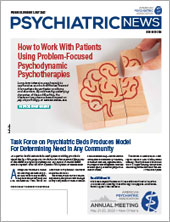The use of most antipsychotics during pregnancy does not appear to increase the risk of neurodevelopmental disorders such as autism spectrum disorder (ASD) or attention-deficit/hyperactivity disorder (ADHD) in the offspring, according to a comprehensive study published in JAMA Internal Medicine.
The one exception was in children whose mothers took aripiprazole during pregnancy, which was linked with a 36% increased risk of a diagnosis of a neurodevelopmental disorder.
“These findings provide much-needed clarity regarding risk [of neurodevelopmental disorders] and may help to inform treatment decision-making in pregnancy, which is a sophisticated trade-off between benefits and risks,” wrote lead author Loreen Straub, M.D., M.S., of Harvard Medical School and colleagues.
The researchers also emphasized that additional studies are needed to confirm the potential risks identified for aripiprazole.
The researchers made use of national public and private health insurance databases to compile information on mothers who filled a prescription for any antipsychotic medication during the second half of pregnancy and their children. The researchers focused on antipsychotic use in the second half of pregnancy because it marks a period of significant brain development for a fetus.
The public data (from Medicaid Analytic eXtract) included more than 2 million pregnancies with no antipsychotic exposure and more than 9,500 with antipsychotic exposure between 2000 and 2014; the private data (from IBM Health MarketScan Research Database) included more than 1.3 million pregnancies with no antipsychotic exposure and more than 1,200 with antipsychotic exposure between 2003 and 2015.
Straub and colleagues compared the rates of the following neurodevelopmental disorders in children who were either exposed or not exposed to antipsychotics in utero: ASD, ADHD, learning disability, speech or language disorder, developmental coordination disorder, intellectual disability, and behavioral disorder. They looked at the risks from any antipsychotic exposure as well as the risks from each of the five most commonly prescribed medications: aripiprazole, haloperidol, olanzapine, quetiapine, and risperidone.
By age 8, 37.3% of the children with public insurance and 24.5% of the children with private insurance whose mothers took antipsychotics during the second half of pregnancy had been diagnosed with at least one neurodevelopmental disorder. For comparison, 23.7% of children with public insurance and 11.0% of children with private insurance who were not exposed to antipsychotics received a diagnosis of a neurodevelopmental disorder. Combined, these rates suggested that antipsychotic exposure during pregnancy was associated with a 1.9-fold increased risk of any neurodevelopmental disorder. When examining the risks of individual disorders, the researchers found that the highest risks were observed for ASD and behavioral disorders. When comparing the risk of individual antipsychotics, the researchers found prescriptions of aripiprazole were associated with about a 2.5-fold increased risk of a neurodevelopmental disorder.
After adjusting for such variables as the mother’s underlying illness and comorbidities, sociodemographic factors, and lifestyle behaviors (such as smoking or drinking), antipsychotic exposure during pregnancy was found to be associated with just a 1.08-fold increased risk of any neurodevelopmental disorder.
“Although the observed 2-fold increase in risk of [neurodevelopmental disorders] is not causally related with in utero exposure to antipsychotic drugs, it does highlight the importance of closely monitoring the neurodevelopment of the offspring of women with mental illness to ensure that early intervention and support can be instituted when needed,” Straub and colleagues wrote.
After adjustments, aripiprazole remained linked with a 1.36-fold increased risk of neurodevelopmental disorders, primarily speech and language disorders and behavioral disorders.
Straub and colleagues noted that aripiprazole is a newer antipsychotic that exerts slightly different effects on dopamine receptors. “This action can result in lactation problems owing to prolactin reduction. Therefore, a potential hypothesis is that aripiprazole’s association with [neurodevelopmental disorders] may be mediated through a reduction in breastfeeding. Our data did not include information on breastfeeding, which may be an important avenue to explore in future studies,” they wrote.
Jennifer Payne, M.D., professor and vice chair for research of psychiatry at the University of Virginia, said that these results should be very reassuring to clinicians, especially given how comprehensive and carefully designed the study was to factor in as many contributing variables as possible.
“[I]f you do enough of these comparative tests, you can eventually get a positive association just by chance, and I think that’s the case with the aripiprazole findings,” she told Psychiatric News. Payne noted that aripiprazole is not the only antipsychotic that can cause prolactin problems and so far there is no indication that aripiprazole is significantly different from other atypical antipsychotics in its clinical benefits or side-effect profile.
Payne said that physicians could certainly look for alternatives to aripiprazole when considering new medication for patients who are pregnant or planning a pregnancy. However, she advised that if a patient is already taking aripiprazole and seems to be responding well to the medication, there is no reason to switch due to a pregnancy.
This study was supported by a grant from the National Institute of Mental Health. ■

